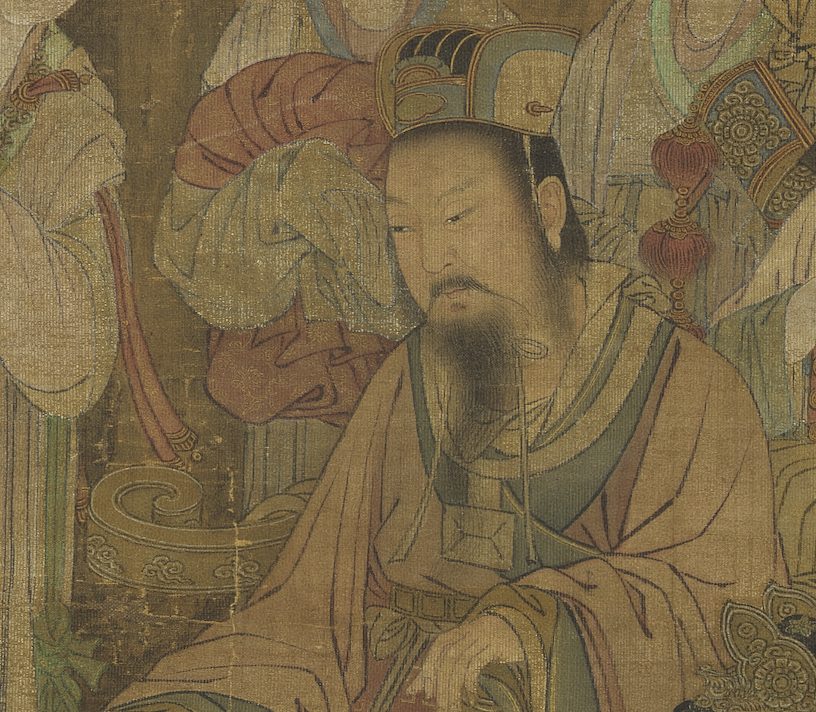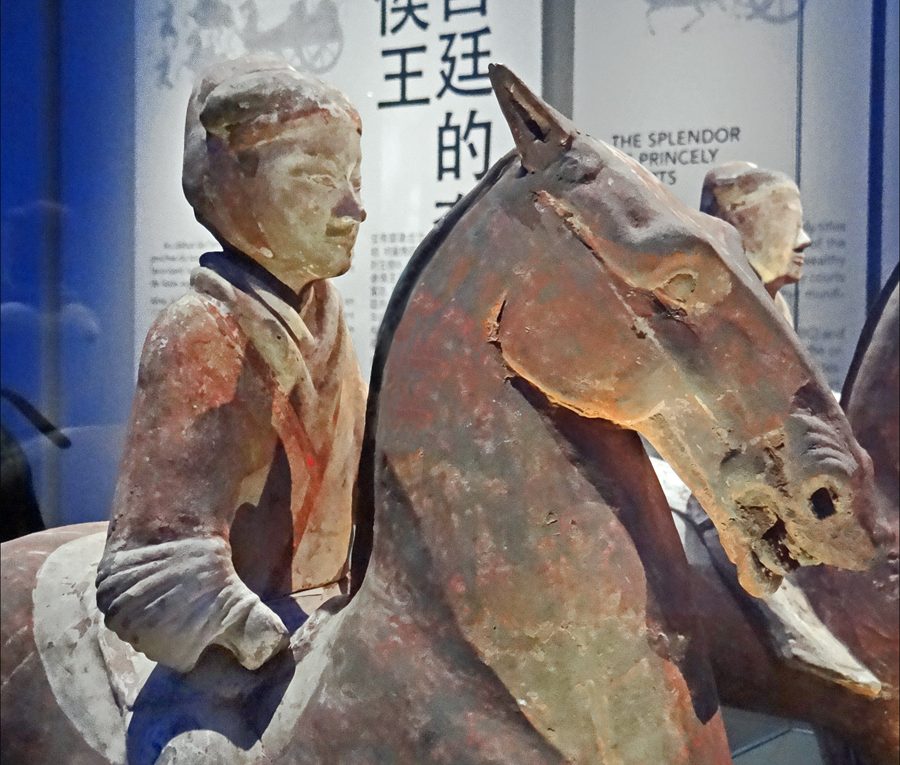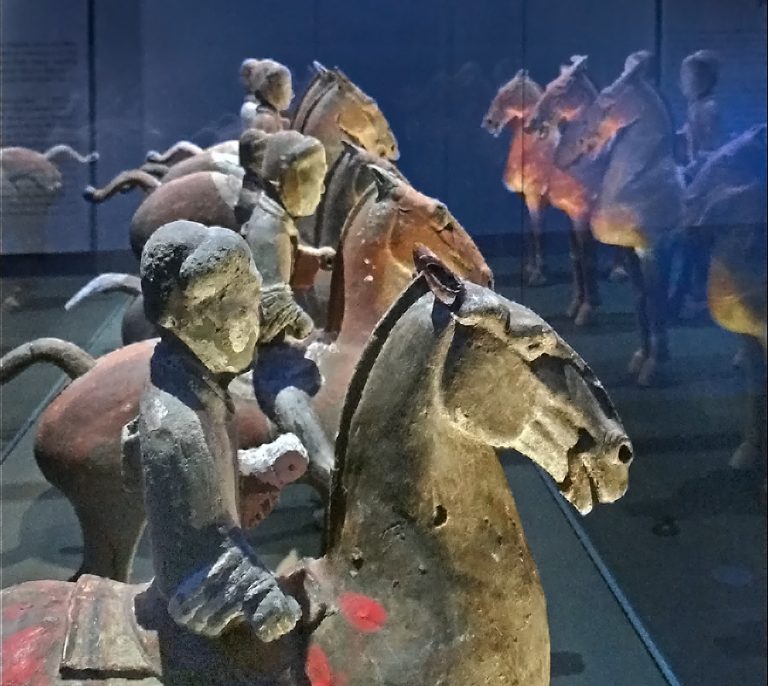Fate and predestiny are ingrained in traditional Chinese belief. The word ming (命), which means “life” in Chinese, is the same character used in words that mean “command” or “order.” Everyone has his or her unique role as arranged by heaven, and is fated to act out his life. It is sometimes said that “life is like a play” (人生如戲) and that humans are simply fulfilling their missions as written according to a script.
Many historical episodes have served to remind of this providential fatality. One such case is that of Zhou Yafu (周亞夫), a general and official who served the imperial government nearly 2,000 years ago in the early Han Dynasty. Despite suffering persecution and eventually dying amidst the court struggles of the dynasty’s turbulent early reign, Zhou maintained his integrity and loyalty, serving his country as foretold in a prophecy.
Foretelling Zhou’s rise and fall
Born in 199 B.C. in the ancient Pei region of eastern China, Zhou Yafu was the son of a general who had fought in the war that brought the Han Dynasty to power in 202 B.C. Like his father, Zhou was a soldier and eventually attained the rank of Tai Wei, the highest military adviser to the emperor. He was later made Prime Minister.
While governing the commandery of Henei in the northwest, Zhou Yafu consulted a well-known fortune-telling woman, Xu Fu, to read his fate.
Xu Fu was a master of physiognomy and, upon observing her client’s face, laid out the major events of his life yet to come:
Success
You are now signed up for our newsletter
Success
Check your email to complete sign up
“In three years, you will be created a marquis, then in eight years, you will become a well-trusted prime minister with high status. In another nine years, you shall die of hunger,” she said.
Zhou Yafu didn’t believe her, especially since his elder brother had already inherited his father’s title of marquis.
“My elder brother has already inherited my father’s title, and even if he dies, his son will inherit it. How could I become a marquis?” he questioned. “And if I to become a prime minister, how is it possible for me to die of hunger? Please enlighten me.”
Xu Fu pointed to his mouth and explained, “This vertical line leading to your mouth indicates death by starvation.”
Her words were accurate. Three years later, Zhou’s brother committed murder and was stripped of his title. Owing to his crime, Emperor Wen of Han (r. 180–157 B.C.) invalidated the elder Zhou’s noble status, and ordered that Zhou Yafu, the second son, take over the marquisate.
A paragon of military discipline
In the sixth year of Wen’s reign, the Xiongnu nomads of the north breached the Han borders. Emperor Wen dispatched Zhou Yafu and two other military officers to fend off the invaders.
To boost morale, Emperor Wen made a personal visit to the troops. When the emperor and his entourage arrived at the camps of the first tow generals, the men and officers were well-prepared for the sovereign’s visit, and riding out to greet him with great formality.

But when Emperor Wen checked in on Zhou’s positions, they found all personnel armed and in armor, ready for immediate combat. An officer on duty stopped the emperor, even as his group approached and a vanguard said “The Emperor is about to arrive,” demanding that he make way.
The officer stood his ground. “The General has given an order: ‘The army takes orders from him alone.'”
Even when the emperor personally approached the gates of the camp, he was not allowed entry. Only after a messenger bearing the imperial seal was sent into the camp did General Zhou give the order and allow the ruler past the camp gate.
The emperor’s train moved slowly, following the protocols set by Zhou. When they arrived, the general was holding his weapon and dressed in full armor. He clasped his hands in salute and told the emperor: “I am a general in armor, so I cannot kneel before Your Majesty. Please excuse my following the military protocol.”
Rather than feeling slighted, Emperor Wen was so impressed that he leaned out of his chariot and gave his own greeting: “We respectfully salute the General.”
When he left the camp, Emperor Wen praised the general’s discipline at length.
“Now here is a true commander! At the first two camps I toured it was like child’s play. If the enemy had attacked then, they would have easily broken in and taken the generals captive. But there is no way they could try anything like that with Zhou Yafu.”
After a month or so, the three armies were demobilized and Emperor Wen officially made Zhou a commandant.
Before Emperor Wen passed away, he advised his son, the future Emperor Jing of Han, “If there is a crisis in the future, Zhou Yafu is the one who can truly lead the army.” When Emperor Wen died, Emperor Jing made Zhou a General of Chariots and Cavalry (車騎將軍).
Quelling the Rebellion of the Seven States
In 154 B.C., the third year of Emperor Jing’s reign, seven rebellious states, including Wu in the east and Chu in the south, revolted. The emperor dispatched Zhou Yafu to fight the insurrection.
Zhou submitted a request to the court: “The forces of Chu have always been good at rapid advance and fierce combat. It will be difficult to defeat them in direct engagement. I suggest we retreat to them to attack the territory of Liang, after which we may cut off their routes of supply from the rear.”
Emperor Jing agreed to the plan.
As the rebel armies from Wu made their way to Liang, Zhou Yafu kept his troops in reserve. Though the king of Liang begged the general for help, Zhou held his forces to the northwest at Changyi, where they dug trenches and constructed a high fortress.
Desperate, the king of Liang sent a messenger to the emperor himself, who, out of pity, ordered Zhou Yafu to save Liang. However, the general was not moved by the situation and did not obey.
Instead, he deployed light cavalry on a swift march to the rear of the Wu and Chu rebels, cutting them off from food and other essentials. Knowing they were trapped, the rebel leaders repeatedly to provoke the imperial forces into open battle, but Zhou did not budge.

Only when the desperate Wu army attacked the imperial camp did General Zhou deign to defend his position. However, the rebels were hungry and attrited by the encirclement, and even an onslaught by elite Wu warriors could not beat the Han Dynasty’s strong fortifications.
Unable to make progress, the famished rebels retreated. At this juncture, Zhou gave the order to counterattack with his best troops. The imperial forces caught up with the tired Wu rebels and defeated them easily. Their king and several thousand Wu survivors and escaped across the Yangtze River. However, he was betrayed by his own men, who surrendered to the Han.
The rebels from the seven states had been defeated in a short three months, and none could say that General Zhou’s plan was not a success. However, the king of Liang bore a grudge against Zhou for refusing to come to his aid.
For his meritorious service, Emperor Jing promoted Zhou to the highest military rank, Tai Wei, the Chief of Defense. Soon thereafter, the emperor made Zhou Prime Minister of the Han Empire.
Just as Xu Fu had foreseen, exactly eight years had passed since Zhou Yafu inherited the title of marquis from his brother.
A loyal minister is dismissed
But just as he had risen in rank, Zhou’s career would soon come crashing down.
Shortly after Zhou was appointed prime minister, Emperor Jing became disappointed with the crown prince and wanted to depose him.
Zhou attempted to talk the emperor out of it, since replacing the heir to the throne could seriously destabilize the empire. However, Emperor Jing would not be dissuaded, and the two began to grow apart.
At the same time, the king of Liang often found opportunity to speak ill of Zhou in from the emperor, and especially in front of the powerful Empress Dowager.
One day, the empress said, “Wang Xin [the empress’ brother] can be made a marquis.” Emperor Jing disagreed, saying, “The previous emperor didn’t make his brothers-in-law marquises until after my reign began. I can’t give the title to my brother-in-law yet.”
However, Emperor Jing’s mother agreed with her daughter-in-law, and urged her son to award Wang Xin a noble.
Emperor Jing said, “Please let me discuss this with my prime minister.”
Zhou Yafu beseeched the emperor to stand his ground, noting the instructions given by Liu Bang, founder of the Han Dynasty and Emperor Jing’s grandfather: “No one who is not from the Liu clan [rulers of the Han] can be created king, and no one who has not achieved merits can be made a marquis.”
“Although Wang Xin is the empress’s brother, he hasn’t accomplished anything, and it is against protocol to make him a marquis,” Zhou said.
Listening silently, Emperor Jing gave up the idea.
However, that was not to be the end of Zhou Yafu’s troubles. Once, the emperor granted noble titles to a number of nomadic men who defected from the Xiongnu tribes. Zhou was vehemently against this decision, saying that rewarding traitors — even if they defected to China — would only encourage disloyalty among the Han Dynasty’s own subjects.
Zhou feigned illness and retired to his hometown. Soon thereafter, in the year 147 B.C., he was dismissed from his position.
A prophecy fulfilled
Some time passed, and Emperor Jing summoned Zhou Yafu to the imperial palace for a banquet, thinking that he might bring him back into service.
But when the former minister entered, he found only a large piece of uncut meat on before him, with no utensils. He attempted to summon a servant to bring him chopsticks, only for the emperor to cut him off.
“Is this not enough to please you?” he snickered.
Realizing that the emperor was trying to humiliate him, Zhou removed his hat, apologized, and found an opportunity to leave early.
The emperor saw him out and said, “A person who complains about everything can’t serve as minister for this young sovereign!”
The final straw came when Zhou Yafu was reported to the authorities for supposedly stockpiling shields and armor in preparation for a coup. In fact, Zhou’s son had procured the equipment for use as funeral pieces, as befitting a military family. However, he had neglected to pay the workers what they were due, and they submitted the false report that the Zhous were plotting rebellion.
And when imperial officials arrived to investigate, Zhou Yafu refused to speak with them.
Hearing of the scandal, Emperor Jing became even more displeased with the former prime minister. When Zhou finally attempted to clear up the confusion and explain himself, the head of the court investigator only said:
“You may not be planning a coup above ground, but you want to rebel from beyond the grave!”
Zhou was arrested, and attempted suicide. However, his wife stopped him and he was delivered to the court. To show his innocence and loyalty, Zhou went on hunger strike. Five days later, he succumbed to his hunger, and was posthumously stripped of his nobility.
It had been exactly nine years since Zhou was made prime minister. All three of Xu Fu’s predictions had come to pass.
In fact, Marquis Zhou’s fate was not set in stone, and it was the accumulation of circumstances that led to his downfall. Despite his early accomplishments, he became stubborn and could not tolerate even small offenses. Had he been more courteous before the emperor, their relationship may have been mended. And had Zhou paid more attention to the behavior of his son, the workers would not have placed him and his family under suspicion.
While one may not be able to affect the greater course of events, it is possible to change your own character. Neglecting minor mistakes may lead to disaster down the road; small acts of hidden virtue may be what it takes to turn one’s fate around.
Translated by Lucy Crawford. Edited by Leo Timm and Ila Bonczek.












